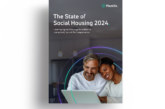Jeff Hewitt discusses how the social housing crisis can be tackled by building tomorrow’s homes with today’s technology.
England is in the midst of a housing crisis, which, if unresolved, will impede social mobility. An estimated 8.4 million people in England are living in unaffordable, insecure or unsuitable homes, according to the National Housing Federation and citizens of all ages are feeling the impact across every part of the country.
Constrained budgets, rapidly changing citizen expectations and increased security and compliance issues are all adding to the pressure on housing associations to offer affordable housing. To relieve this pressure housing associations are striving to better connect employees and customers to deliver improved outcomes for their communities. Here, we explore three ways digital housing platforms can help providers adapt to the constant changes and demanding landscape they operate in.
Unlocking data for better services
Housing associations sit on a goldmine of data and unlocking the power of the information they hold is key to building a digital platform that can address many of the challenges they face. Sometimes, poor decisions can occur when data is not consolidated. By creating a single holistic view of critical data, social housing providers will gain a better understanding of people and their homes. For example, this single view, which is enabled by the cloud, streamlines the customer experience by allowing providers to quickly understand factors such as the number of customers on housing waiting lists and the value of rent arrears owed.
And it will help processes internally too. Having all data in one place, on a scalable platform, allows social housing providers to understand the financial consequence of every decision. It enables organisations to identify where spending inefficiencies occur in real-time, meaning internal processes can be streamlined and decisions can be driven by live data, on the ground, on the spot.

Avoid additional costs by ensuring compliance
Three million new social homes must be built in England over 20 years to solve the ‘housing crisis’. With this many new homes, it’s essential that social housing providers have a single view of their housing assets and financial management. Using Civica’s cloud-based Cx housing and financial management software provides a real-time view on rent payments and arrears. This enables organisations to work smarter through automation and streamlining processes.
In addition, predictive technologies such as artificial intelligence and robotic process automation can help organisations proactively spot problems before they occur, which reduces risk and supports the compliance of data and assets.
While many social housing providers might not yet think they are in a position to implement these predictive technologies, there are financial solutions that many providers use today that offer live management information, and the ability to study costs and profitability based on real-time data. Unitas, the housing repair and maintenance company of Stoke-on-Trent City Council recently integrated their repairs and maintenance solution with Civica’s financials cloud software to access real-time management information, streamline invoice management and quickly monitor and analyse both costs and profitability.
Driving a digital agenda
Online banking, Amazon and other retailers have raised the bar in terms of self-service customer experience and citizens expect similar levels of service from local authorities. 24-hour contact and delivery, at any location, and flexibility in the variety of channels that citizens can use to interact with organisations should be the minimum from the housing sector. Residents want to be able to contact and speak to their social housing provider through the means and channels of their choice, and they expect instant responses. That’s why social housing providers need software that can help them deliver efficient, connected and responsive services to customers, enabling them to self-serve and speak at the time and through the channel of their choice.
Technology is helping to expand the line of communication across the board. Cloud software facilitates mobile working, as employees working for social housing organisations and local authorities can work within communities to securely share live information with residents and partners, while also supporting a paperless agenda. For example, Prospect Community Housing has improved communications and increased channel shift, with 35% of its customers switching to self-serve in the first three months, showing the need to move online to increase speed and ease.
Through access to a single view of data, and greater insights into where money and time is spent, housing providers can both overcome market challenges and deliver better outcomes for people and communities.
Jeff Hewitt is Executive Director Housing & Communities at Civica









